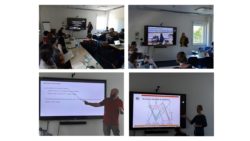Advanced training course 4: Leipzig, Germany. May 2019
Prof Martin Volk (UFZ, Leipzig) led the organisation of a facilitated workshop held at UFZ from May 12th-17th, 2019 to examine large-scale effects of river regulation and e-flows on water quality. An impressive group of 32 skilled people came together to deliver a long list of training concepts starting from teamwork, through prioritisation and defining research questions and hypotheses, writing manuscripts for publication, presentation and negotiation, organisation and collaboration. The week was packed with scientific content as well as social interactions between ESRs and researchers in the wonderful surroundings of Leipzig.
On day 1, the workshop heard a series of excellent, thought-provoking talks from invited speakers to frame the context of the workshop (Fig. 9). First, Dr Taylor Maavara (Yale, USA) introduced her biogeochemistry research which has included the development of large-scale nutrient models, in particular focusing on the impacts of anthropogenic climate change, land cover change, and river damming. In the context of Euro-FLOW, Taylor explained how her global regulated river models might be modified to assess whether dams can be used to maintain environmental flows, and explore nutrient cycles responses to different flow scenarios. Dr Rebecca Tharme (Riverfutures) presented key ideas that have developed from her worked in different project teams in developing countries of Africa, Asia and Latin America, and at the science-practitioner-policy interface. A key focus of the talk was on integrating eco-hydrologists with social scientists, to work together on water maintenance recommendations understanding indigenous people's values, power dynamics, and more, in an uncertain future. Dr Ronny Lauerwald (Université Libre de Bruxelles ) then introduced his research interest around the role of continental waters in global biogeochemical cycles, with a specific focus on regional to global scale analysis of carbon and nutrient fluxes through the land-ocean aquatic continuum. Work that was relevant to the workshop in particular included recent studies of greenhouse gas exchange with the atmosphere and retention of carbon and nutrients in lakes and reservoirs. Dr Marloes Mul (IHE Delft) presented some of her extensive work from the global South, including understanding hydrological processes in Tanzania, transboundary river basin management in South East Asia, and agricultural water management in West Africa. Of particular interest to the Euro-FLOW project was her work on river basin allocation and dam operation, and specifically the feasibility study for re-operating Akosombo and Kpong dams in southern Ghana.
Speakers at the UFZ workshops

Days 2 and 3 were reserved for both plenary and small group discussions (Fig. 10), in which participants considered what some of the key questions might be that our group could take forward for further study. Through a series of refinements, the group converged on an idea that incorporated a novel scientific idea with the ability to undertake that work with the collective expertise in the group. This idea centred around the modification of an existing modelling framework that Dr Mavaara has developed for examining regulated river effects on nutrient export downstream, to determine the extent to which e-flow scenarios could be implemented to drive improved water quality across Europe.
Workshop discussions

The group took a break for a field trip to the Leipzig Floodplain Forest outside Leipzig, and were treated to a tree-top ride on a crane used by other Leipzig researchers studying forest dynamics and biodiversity. On days 4 and 5, participants then worked further in small groups to review literature for existing datasets, to analyse initial findings, and to begin writing the structure of a joint-authored publication. Given the presence of 32 attendees during these 5 days, the work done represented the equivalent of around half a year of an individual person’s time to work on a novel piece of science! The discussions held during the Leipzig EuroFLOW workshop have begun to pave the way for improved integration of the global modelling of reservoir nutrient dynamics with downstream environmental flow scenarios – a much needed and exciting area of future interdisciplinary research.
